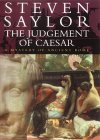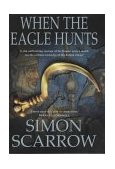 by Steven Saylor
by Steven Saylor
The next novel in the Roma Sub Rosa series follows Gordianus the Finder to Egypt, at the same time that Julius Caesar arrives for his fabled first encounter with Queen Cleopatra. Against the backdrop of the teeming city of Alexandria - home of the great Library, the Pharos lighthouse, and the tomb of Alexander the Great - many of the plot-threads in the recent novels (Bethesda's illness, Gordianus's estrangement from his son Meto, the chaos of the civil war) come to a stunning resolution.
Last night I finished Steven Saylor's Arms of Nemesis and found it a wonderfully taut and well-researched thriller. It is my first experience with Steven's books and I am looking forward to the rest of his books with eagerness. (I started another of his books, The Venus Throw, this morning on my commute) I can now be counted among the avid fans of Gordianus the Finder and have been wracking my brain to think of a suitable actor if we should be fortunate enough to have one or more of these books made into a film. The actor that keeps coming to mind is Elliot Gould, although he's getting a little old for the part now. He possesses the quick intelligence of Gordianus but a certain earthiness, too, that would be required for the part.
In one of his lesser known movies, Capricorn One, he played such a character, as an investigative journalist seeking to find out the truth about a space mission to Mars. The government has publicized a space mission to Mars and even televised the astronauts in space and on the planet but Gould's character finds out that it is all a hoax filmed on an old movie set. A big problem arises when the returning (empty) space capsule burns up on reentry and the government needs to dispose of the (still living) astronauts before the world finds out about the deception.
I thoroughly enjoyed the characters depicted in Arms of Nemesis and quickly became as anxious for Gordianus to save the slaves, including beautiful Apollonius and mischievous Meto, as gruff but sensitive Marcus Mummius. There were only a couple of historical details that gave me pause and Steven cleared up one of them in the epilogue. Marcus Mummius was bearded as were several other people described at the funeral games. After our discussion on beards and fashion in the late Republic, I thought this might be a slip, but Mummius arrives clean shaven in the end and mentions that he was urged to shave his beard so he would be perceived as more fashionable when he launches into politics to become praetor urbanus in Rome. The other issue I am still unsure about is the presence of slaves on the "Fury". I had read a critical review of Ben Hur and one of the most pointed criticisms was that slaves were not used in Roman military galleys. Now, the "Fury" was not exactly a military galley. It apparently was used as a merchant ship as well. So, perhaps, slaves were used on merchant galleys.
I particularly enjoyed Steven's characterization of Metrovius – a much more cynical older man than the innocent boy actor and paramour of Sulla in Colleen McCullough's The Grass Crown. My interest was also peaked by the discussion of the slave revolt in Sicily led by the wizard Eunus. I found the details described by Diodorus Siculus even more fascinating (http://www.fordham.edu/halsall/ancient/3slaverevolttexts.htm). It makes me wonder why A&E plans to remake "Spartacus" when they could produce a fresh screenplay about the Sicilian slave revolt and even include the wizadry of Eunus to appeal to the much-sought-after young male viewers market.
 "A host of totally new stories written by some of the most popular writers of historical mysteries brings to life the glorious and nefarious world that for nearly a thousand years—from the founding of the Republic in 510 B.C. to the deposing of the last emperor, Romulus, in 476 A.D.—was ancient Rome. Events from the turbulent reigns of Julius Caesar, Augustus, Caligula, and Nero provide the colorful background to tales ingeniously contrived by contributors like Paul Doherty, Gillian Bradshaw, and Richard Butler. While John Maddox Roberts offers a new SPQR story, Steven Saylor, Marilyn Todd, Rosemary Rowe, Darrell Schweitzer, and Michael Kurland challenge their sleuths Gordianus the Finder, Claudia, Libertus, Pliny the Younger, and Quintilian with baffling new cases. Mary Reed and Eric Mayer conjure new intrigue for John the Eunuch, and Peter Tremayne sends his Fidelma on the trail of a Roman legion lost in Ireland. In addition to the original stories specially commissioned for this volume, this book also includes such rare reprints as a Slave Detective story by Wallace Nichols and one of the earliest historical mysteries to be set in Rome, 'De Crimine' by Miriam Allen de Ford. which features Cicero as the investigator. "
"A host of totally new stories written by some of the most popular writers of historical mysteries brings to life the glorious and nefarious world that for nearly a thousand years—from the founding of the Republic in 510 B.C. to the deposing of the last emperor, Romulus, in 476 A.D.—was ancient Rome. Events from the turbulent reigns of Julius Caesar, Augustus, Caligula, and Nero provide the colorful background to tales ingeniously contrived by contributors like Paul Doherty, Gillian Bradshaw, and Richard Butler. While John Maddox Roberts offers a new SPQR story, Steven Saylor, Marilyn Todd, Rosemary Rowe, Darrell Schweitzer, and Michael Kurland challenge their sleuths Gordianus the Finder, Claudia, Libertus, Pliny the Younger, and Quintilian with baffling new cases. Mary Reed and Eric Mayer conjure new intrigue for John the Eunuch, and Peter Tremayne sends his Fidelma on the trail of a Roman legion lost in Ireland. In addition to the original stories specially commissioned for this volume, this book also includes such rare reprints as a Slave Detective story by Wallace Nichols and one of the earliest historical mysteries to be set in Rome, 'De Crimine' by Miriam Allen de Ford. which features Cicero as the investigator. "
 "The Roman conquest of Britain continues as seasoned Centurion Lucius Cornelius Macro and young Optio Quintus Licinius Cato, an educated former slave, embark upon their most dangerous mission yet. During the harsh winter of 44 CE, the wife and young children of General Plautius are held hostage by a tribe of primitive Druids. In addition to the enemy, the Romans must battle against the brutal weather conditions demoralizing their troops. Threatening to burn their prisoners alive if their own captured comrades are not released, the Druids of the Dark Moon give the Romans 30 days to make the exchange. Unwilling to let the Druids dictate terms to Rome, Plautius prepares the Second Legion to advance on the Britons. Racing against time, Macro and Cato scramble to find Lady Pomponia and her children before they are offered as human sacrifices to the Druid gods. "
"The Roman conquest of Britain continues as seasoned Centurion Lucius Cornelius Macro and young Optio Quintus Licinius Cato, an educated former slave, embark upon their most dangerous mission yet. During the harsh winter of 44 CE, the wife and young children of General Plautius are held hostage by a tribe of primitive Druids. In addition to the enemy, the Romans must battle against the brutal weather conditions demoralizing their troops. Threatening to burn their prisoners alive if their own captured comrades are not released, the Druids of the Dark Moon give the Romans 30 days to make the exchange. Unwilling to let the Druids dictate terms to Rome, Plautius prepares the Second Legion to advance on the Britons. Racing against time, Macro and Cato scramble to find Lady Pomponia and her children before they are offered as human sacrifices to the Druid gods. "
 "Tribune Marcus Flavius has secured command at
"Tribune Marcus Flavius has secured command at  Review By Mary Harrsch
Review By Mary Harrsch
 "Decius Caecilius Metellus has just become an aedile, a city manager responsible for overseeing urban infrastructure, when he's summoned to a fatal building collapse that claims more than 200 lives. While the evidence of shoddy workmanship is consistent with the pervasive but tolerated corruption in the construction trade, Decius's trained investigative eye notes anomalies on several of the corpses; he risks his political future and his life to follow the clues. His powerful family's efforts to navigate the treacherous shifting alliances that preceded Julius Caesar's return from the Gallic Wars add to the pressures the aedile faces. "
"Decius Caecilius Metellus has just become an aedile, a city manager responsible for overseeing urban infrastructure, when he's summoned to a fatal building collapse that claims more than 200 lives. While the evidence of shoddy workmanship is consistent with the pervasive but tolerated corruption in the construction trade, Decius's trained investigative eye notes anomalies on several of the corpses; he risks his political future and his life to follow the clues. His powerful family's efforts to navigate the treacherous shifting alliances that preceded Julius Caesar's return from the Gallic Wars add to the pressures the aedile faces. "